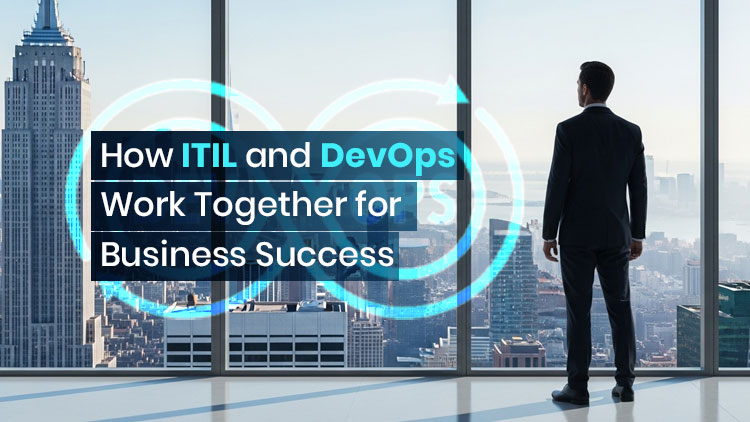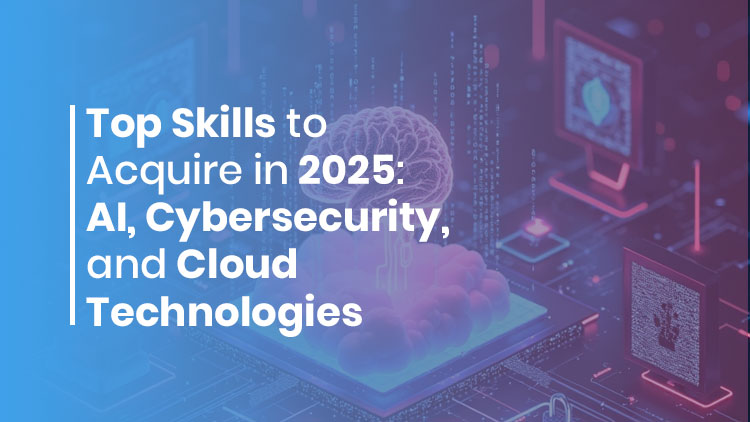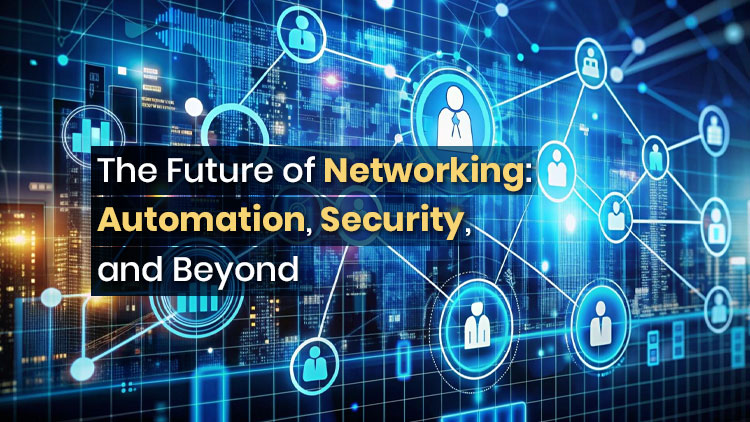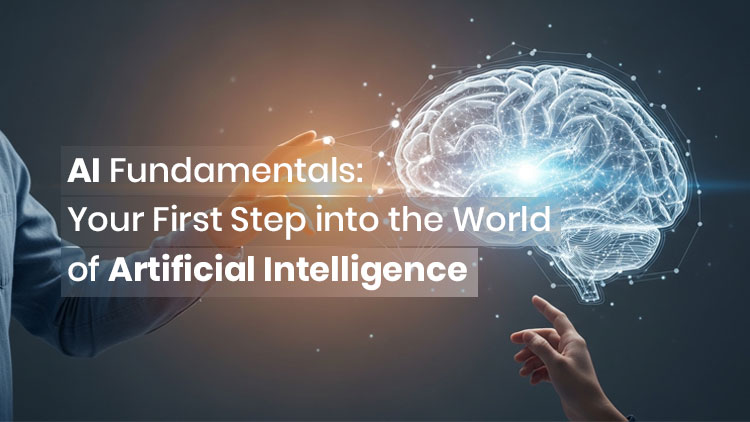
Top Skills to Acquire in 2025: AI, Cybersecurity, and Cloud Technologies

Top Skills to Acquire in 2025: AI, Cybersecurity, and Cloud Technologies
Introduction
We are already halfway through 2025 a year of rapid technological advancements, changing job markets, and accelerated digital transformation in almost every sector. Forecasts made only a few years ago are now playing out in real-time. Artificial Intelligence (AI) technologies have gone from experimental to indispensable. Cybersecurity is now a frontline imperative instead of an afterthought. And cloud technologies are no longer a competitive advantage, they are a minimum requirement.
For students and professionals alike, the first six months of the year have served one purpose loud and clear: to remain competitive, you must remain up-to-date. Whether you’re seeking to future-proof your career, change professions, or simply keep pace, this is the time to revisit your skillset. In this blog post, we’ll guide you through the top three technologies in demand, AI, cybersecurity, and cloud technology, and how to become proficient in them within the next few months of 2025.
Looking to upgrade your tech skills in 2025? Explore expert-curated courses in terms of practice questions and exam cram notes at VERSAtile Reads. From AI and cybersecurity to cloud technologies, we’ve got the resources you need to thrive. Start your learning journey today at VERSAtileReads.com and stay ahead of the curve.
Why Technical Skills Are More Important Than Ever in 2025
The rate at which technology is progressing in 2025 is exhilarating and demanding. With automation, remote work, and data-based operations being the new standards, the nature of work is undergoing a transformation. Employers are no longer in search of diplomas, employers are seeking evidenced skills and versatility.
AI is not only automating manual processes but also thinking processes. Cybersecurity attacks are more complex, and so are the defenses needed. And cloud computing keeps becoming more efficient, scalable, and less expensive. These are not niche domains, they’re fundamental. It’s no longer a choice for professionals to master them to remain relevant.
Artificial Intelligence: The Cornerstone of Future Innovation
Artificial Intelligence has been in the spotlight in 2025. With AI copilots like ChatGPT-5, Google Gemini, and others built into productivity suites, the typical employee is exposed to AI every day. AI is not just changing sectors such as healthcare, finance, and logistics, it is changing the way people work.
Why AI Matters Right Now
- AI is driving customer service chatbots, sales forecasting engines, medical diagnosis, and even creative writing software.
- Prompt engineering has become a high-value competence for the professionals who are able to design good AI instructions.
- The AI market is likely to cross $200 billion this year alone, and the postings for AI jobs have seen more than 40% growth in the first half itself.
How to Begin Learning AI in 2025
- Languages & Tools: Python remains the leading language in AI due to its simplicity and robust ecosystem. Key libraries such as TensorFlow, PyTorch, and Hugging Face continue to empower developers to build scalable AI models and applications.
- Courses & Certifications: IPSpecialist offers fast-track AI certifications tailored for today’s learners, covering key domains like natural language processing (NLP), computer vision, generative AI, and AI ethics. These programs are designed to be hands-on, industry-relevant, and ideal for career advancement.
- Hands-On Projects: Apply your knowledge by building practical tools such as AI-powered chatbots, recommendation engines, or productivity assistants. IPSpecialist provides guided labs and real-world scenarios using APIs from platforms like OpenAI and Cohere to help you gain confidence through real application.
Emerging Roles in AI
- Machine Learning Engineer
- AI Product Manager
- Prompt Engineer
- AI Integration Specialist
Investing time in AI today means preparing for a future where your ability to work with machines could be your greatest career asset.
Cybersecurity: Safeguarding a Digitally Dependent World
Cybersecurity is now a fundamental responsibility for each business function and employee. Following a spate of large-scale data breaches in early 2025, to include assaults on healthcare networks and financial services, cybersecurity has moved top of boardroom agendas and budgets.
Why Cybersecurity Is More Important Than Ever
- AI-powered cyberattacks are quicker, more evasive, and more potent.
- With hybrid workspaces, endpoint, network, and data protection has become increasingly challenging.
- Regulation models are enforcing stricter compliance and risk control.
How to Begin Studying Cybersecurity in 2025
- Foundational Knowledge: Begin by understanding the core pillars of cybersecurity, network security, encryption, firewalls, and identity and access management.
- Certifications: Start with industry-recognized credentials like CompTIA Security+ or the Google Cybersecurity Professional Certificate. As your knowledge deepens, pursue advanced certifications such as CISSP or Certified Ethical Hacker (CEH).
- Hands-On Labs: Practical experience is key. Explore immersive, scenario-based labs offered by IPSpecialist, where learners can simulate real-world attacks and defense strategies in a safe, guided environment.
In-Demand Cybersecurity Jobs
- Security Operations Center (SOC) Analyst
- Threat Intelligence Officer
- Cloud Security Architect
- Ethical Hacker / Penetration Tester
Cybersecurity professionals are not just well-paid, they are vital protectors of the digital world. This career provides long-term stability and a sense of purpose, making it one of the most rewarding tech careers of the decade.
Cloud Technologies: Facilitating Scalable, Agile, and Intelligent Systems
Cloud computing has come a long way from being a technical indulgence to a operational imperative. Be it hosting sites, running data pipelines, or rolling out applications, the cloud is at the center of today’s infrastructure. In 2025, more than 90% of organizations across the world have deployed some kind of cloud solution.
Why Cloud Technologies Are Foundational
- Cloud enables firms to scale without physical infrastructure.
- It enables remote collaboration, disaster recovery, and real-time data processing.
- Innovations such as serverless computing, Kubernetes, and edge computing are opening up new possibilities.
How to Begin Learning Cloud Technologies in 2025
- Select a Platform: Start with one of the big three, Amazon Web Services (AWS), Microsoft Azure, or Google Cloud Platform (GCP).
- Certifications: Begin with core certs such as AWS Cloud Practitioner or Azure Fundamentals. Then proceed to role-based ones such as AWS Solutions Architect.
- Build Projects: Host a personal website on S3 or Netlify, establish a CI/CD pipeline, or develop an auto-scaling cloud application.
High-Demand Cloud Roles
- Cloud Solutions Architect
- DevOps Engineer
- Site Reliability Engineer (SRE)
- Cloud Data Engineer
You want a skill that is conducive to both AI and cybersecurity and cloud computing can be a very good middle area that provides depth as well as breadth.
Summary
To stay current in today’s technology-enabled world, professionals require more than ambition, more than aspiration, they require actionable, adaptive skills. AI teaches you to collaborate with machines. Cybersecurity teaches you to safeguard what matters most. And cloud computing enables you to create resilient, scalable solutions. These aren’t tools, they’re doorways to future-proof careers.
Conclusion
The pace of innovation in 2025 shows no signs of slowing down. The good news? You still have time. Whether you’re reskilling, upskilling, or just entering the workforce, the remaining months of this year can be transformative. The future belongs to those who adapt, choose a skill, commit to learning, and invest in yourself. By the time we enter 2026, you could be stepping into a new role, a new industry, or even a whole new version of yourself.
FAQs
Q1: Can we still begin learning these skills in the second half of 2025?
Yes, definitely. Through targeted online courses, short-term certifications, and hands-on projects, you can establish a good grounding in any of these areas in a matter of a few months.
Q2: What skill do we need to target if we have no tech background?
Cloud computing is an excellent starting point because of its well-defined structure and newbie-friendly certifications. Cybersecurity also has entry-level paths through general awareness and ethical hacking fundamentals.
Q3: Are certifications still worth it in 2025?
Yes. Although project portfolios and practical skills are valuable, certifications still authenticate your knowledge and enhance your opportunities of being recognized by recruiters and hiring managers.
- Published Date:



